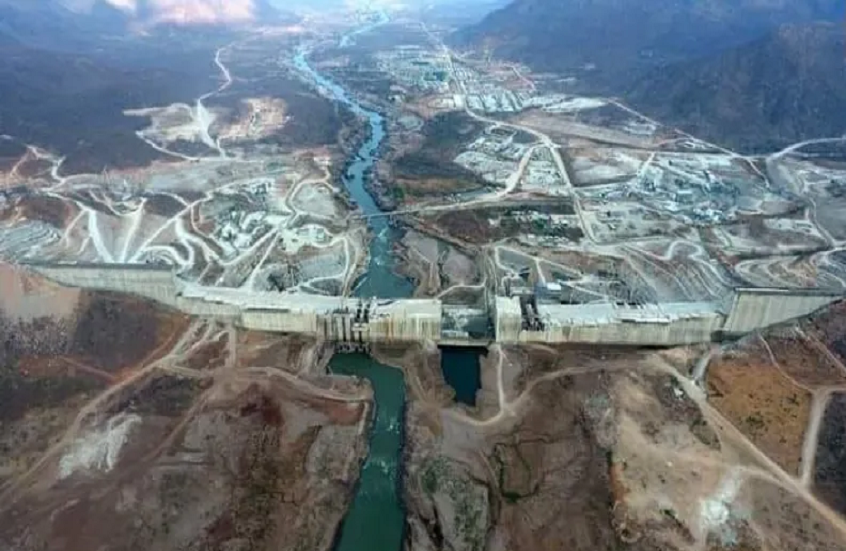Ethiopian Prime Minister Abiy Ahmed stated that massive projects like the Ethiopian Renaissance Dam will be launched within 5 to 15 years, considering that “benefiting from the Nile is neither a mistake nor a crime.”
In a television interview, Abiy Ahmed added that completing the construction of the Renaissance Dam and starting its operation marked an important stage in Ethiopia’s geopolitical history and significantly improved the country’s geopolitical standing.
He mentioned that the greatest challenge Ethiopia has faced throughout history was related to the Nile River, adding that “Ethiopia has been treated harshly in the Renaissance Dam issue as if it took something that does not belong to it, while it has only started using the river’s resources in a limited way.”
He spoke about Ethiopia’s presence in the Red Sea, which Addis Ababa aims to regain, saying “The Red Sea was ours 30 years ago, and past mistakes will be corrected,” but he pointed out that the Nile issue is much bigger than other problems.
The Ethiopian Prime Minister claimed that those who fear the impact of building the Renaissance Dam will discover it will not harm them, confirming that massive projects like the Renaissance Dam will be implemented in the coming years.
He continued: “We saw that we can start and complete projects now, and if we can achieve the dream of the Renaissance Dam and solve its problems, we can solve other smaller problems, which will improve our economic situation.”
He pointed out that the response to talk about stopping the dam’s water flow is that “the dam is not designed for that,” and it currently stores 74 billion cubic meters of water, yet the Nile continues to flow to neighboring countries.
Abiy Ahmed renewed his assertion that “what has been achieved in the Renaissance Dam is only the beginning,” explaining that his country “started with one project, but we can build more dams in the Nile Basin to generate huge amounts of energy, not only for Ethiopia but for the entire region and to protect the environment.”
He said Ethiopia is fully committed not to harm downstream countries, and the goal of the dam is to generate electricity and manage water in a way that serves joint development.
Ethiopia considers the Renaissance Dam to be built within its territory, while Egypt and Sudan demand cooperation and information exchange about the dam as it is built on a shared international river.
Egypt repeatedly affirms its commitment to preserving its water rights in the Nile and rejects unilateral actions taken by Ethiopia in the southern basin of the river, demanding a binding agreement that achieves the interests of all parties and allows Ethiopia to benefit from the water without harming Egypt’s interests.
A statement issued last month by the Egyptian Ministries of Foreign Affairs and Irrigation said, “Egypt has always adhered to cooperation and achieving mutual benefit with all brothers from the Nile Basin countries, and we are confident that preserving Egyptian water security does not mean affecting the developmental interests of the sister Nile Basin countries.”
It affirmed that “the required balance can be achieved by adhering to the rules of international law governing the Nile River and the necessity of cooperation to achieve mutual benefit based on international law.”
Egyptian President Abdel Fattah el-Sisi also stated days ago that “those who imagine that Egypt will turn a blind eye to an existential threat to its water security are mistaken,” stressing that Egypt will not give up its water rights because that “means giving up our lives.”
In a press conference with his Ugandan counterpart following talks in Cairo, el-Sisi said Egypt will continue to follow this file and take all measures guaranteed under international law to preserve the existential capabilities of the Egyptian people, stressing Egypt’s complete rejection of unilateral measures in the Eastern Nile Basin, “which Cairo has sought to be a source of cooperation, not conflict.”
El-Sisi spoke about the volume of rainfall falling on the Nile Basin estimated at 1600 billion cubic meters, of which only 85 billion cubic meters reach Sudan and Egypt, equivalent to only 4%, adding: “When we ask that this amount of water reach Egypt and Sudan for living, because we have no other source besides them, does that mean rejecting development in the basin countries or rejecting the use of available water whether in agriculture or electricity production? Of course not.”
He continued: “I tell Egyptians that our position from the beginning is that we are not against development, and we have not even talked about fair water sharing, as that would mean discussing the 1600 billion cubic meters of water, but we are talking about the remainder which does not exceed 4% or 5%, and that is very important.”
On Wednesday, Egypt and Sudan confirmed in a joint statement the inseparable link of Sudanese and Egyptian water security, reiterating their complete rejection of any unilateral moves in the Eastern Nile Basin that would harm their water interests.
The two countries stated after meetings of the 2+2 consultative mechanism for foreign and irrigation ministers in both countries, “the necessity of securing the water security of the Nile River basin countries, and joint work to preserve the full water rights and uses of both countries, according to the legal regime governing the Nile River within the framework of the principle of a community of shared interests and equality of rights, according to international law and the 1959 agreement concluded between the two countries.”
Source: Ethiopian Fana Radio + RT













Recommended for you
Exhibition City Completes About 80% of Preparations for the Damascus International Fair Launch
Talib Al-Rifai Chronicles Kuwaiti Art Heritage in "Doukhi.. Tasaseem Al-Saba"
Unified Admission Applications Start Tuesday with 640 Students to be Accepted in Medicine
Egypt Post: We Have Over 10 Million Customers in Savings Accounts and Offer Daily, Monthly, and Annual Returns
His Highness Sheikh Isa bin Salman bin Hamad Al Khalifa Receives the United States Ambassador to the Kingdom of Bahrain
Al-Jaghbeer: The Industrial Sector Leads Economic Growth